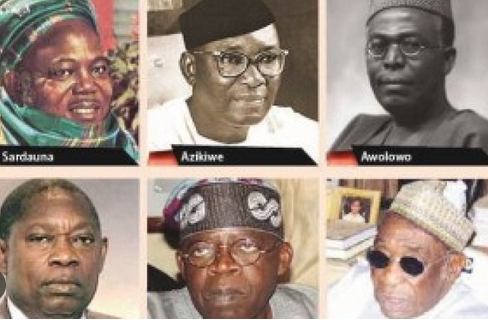
support@yorubalibrary.com
+2348073529208, 07038599574

The Yoruba people have made significant contributions to political systems in Nigeria and beyond. Known for their rich cultural heritage and historical significance, the Yoruba have produced many notable figures in politics. This article explores some of the most influential Yoruba individuals and their impact on political systems.
Obafemi Awolowo: The Visionary Leader
Obafemi Awolowo is a name synonymous with political leadership in Nigeria. Born in 1909, he was a nationalist and statesman who played a crucial role in Nigeria’s struggle for independence. Awolowo founded the Action Group in 1951, a political party that championed federalism as the best governance structure for Nigeria. His tenure as Premier of the Western Region from 1954 to 1960 saw the implementation of progressive policies, including free primary education and healthcare, which set the region apart.
Bola Ahmed Tinubu: The Political Strategist
Bola Ahmed Tinubu, often referred to as the "Jagaban," is another prominent Yoruba figure in Nigerian politics. As the former governor of Lagos State from 1999 to 2007, Tinubu's influence extends beyond his tenure. He played a pivotal role in the formation of the All Progressives Congress (APC), which has become one of the major political parties in Nigeria. Tinubu's strategic acumen has made him a key figure in shaping political alliances and policies.
Funmilayo Ransome-Kuti: The Trailblazing Activist
Funmilayo Ransome-Kuti, born in 1900, was a leading feminist and political activist in Nigeria. She was the first woman to drive a car in Nigeria and a formidable advocate for women's rights. Her political activism led to her involvement in the struggle for Nigeria's independence and her membership in the National Council of Nigeria and the Cameroons (NCNC). Ransome-Kuti's work laid the groundwork for future generations of women in Nigerian politics.
Wole Soyinka: The Nobel Laureate and Social Critic
Wole Soyinka, a renowned playwright, poet, and essayist, has also played a significant role in Nigeria's political landscape. As the first African to win the Nobel Prize in Literature in 1986, Soyinka has used his platform to speak out against political oppression and corruption. His involvement in pro-democracy movements and his criticism of military regimes in Nigeria have made him a key figure in the fight for democracy and human rights.
Chief Moshood Kashimawo Olawale Abiola: The Democratic Hero
Chief MKO Abiola, born in 1937, is best remembered for his pivotal role in Nigeria’s democratic journey. He won the 1993 presidential election, which was later annulled by the military government, leading to widespread protests and his eventual imprisonment. Abiola's unwavering commitment to democracy and his ultimate sacrifice remain a testament to his enduring legacy in Nigerian politics.
Conclusion
The contributions of Yoruba people to political systems in Nigeria are profound and far-reaching. From pioneering leaders like Obafemi Awolowo to contemporary influencers like Bola Ahmed Tinubu, the impact of these individuals continues to shape the political landscape. Their legacies of leadership, activism, and reform highlight the significant roles Yoruba people have played in fostering political development and governance in Nigeria

Learn about the Yoruba concept of Ìwà Pẹ̀lẹ́ (good…

Learn special praises for Divine Being and Creator…